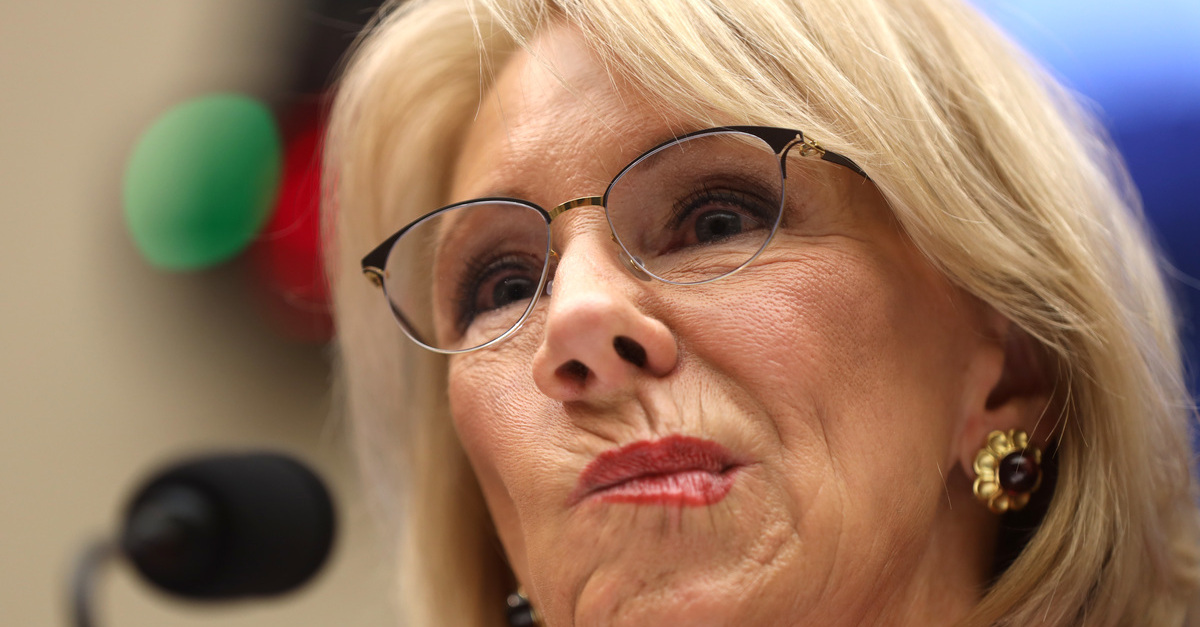
A coalition of states and school districts scored a “big win” against Education Secretary Betsy DeVos on Wednesday when a federal court blocked a Department of Education (DOE) rule that would have diverted CARES Act funding from public to private schools.
The Congressional CARES Act earmarked approximately $16 billion to help elementary and secondary schools maintain their operations and provide effective education during the pandemic. The distribution of those funds was to be managed through two programs: the Governor’s Emergency Education Relief (GEER) (which allows state governors to distribute funds at their discretion), and the Elementary and Secondary School Emergency Relief (ESSER) (which allocates funds to each state, “in the same proportion as each State received under part A of title I of the [Elementary and Secondary Education Act (ESEA)] of 1965 in the most recent fiscal year”).
In addition to appropriating the funding, the CARES Act also directs local educational agencies to share both GEER and ESSER funds with private schools. Historically, those agencies used a formula (derived from Section 1117 of the ESEA) which allocated funding to private schools based on the number of low-income students served by various private schools. The DOE, though, issued a rule that would change things up in the context of CARES funding: instead of apportioning funding based on low income students enrolled, schools would calculate based on total student enrollment. The net result would be that more CARES funding would make its way to private schools.
Michigan, California, Hawaii, Maine, Maryland, New Mexico, Pennsylvania, Wisconsin, the District of Columbia as well as public school districts in New York City, Chicago, Cleveland and San Francisco sued to block the DOE’s rule. U.S. District Judge for the Northern District of California James Donato handed down the ruling on Wednesday.
In his ruling, Judge Donato, a Barack Obama-appointee, dismissed outright the DOE’s argument that Congress had been ambiguous as to how CARES funding should be distributed. Donato called Congress’ intent “plain as day,” and found that it “leave[s] no room for any other reading” than one requiring application of the same Section 1117 formula for distribution of CARES funding.
The judge, resurrecting some language from one of late Justice Antonin Scalia’s colorful dissents, called the DOE’s argument “interpretive jiggery-pokery in the extreme.”
Granting plaintiffs’ request for an injunction, Judge Donato pointed out that the irreparable harm at risk by implementation of DeVos’s rule was “largely conceded” by the DOE itself. Still, “for the sake of illustration,” however, the judge detailed some of the specific harm. For example, the $16,496,727.63 Michigan would be required to divert “would be the equivalent of laying off 466 teachers from public schools in Flint, Michigan,” wrote Donato. The Oakland Unified School District would need to continue soliciting private food and technology donations; Wisconsin schools would be forced to abandon district-wide coronavirus preparation such as sanitizing school buses.
Angela Morabito, a spokesperson for the DOE, reacted to the court’s decision saying, “the pandemic affected all students and the CARES Act requires federal funds help all students.” The department was “following the law,” the statement said.
The decision is being hailed as a “big win” for public school districts by at least one the attorneys general involved in the case.
Big win for Michigan kids! Thanks to my hardworking staff who argued this important case. #SupportPublicSchools
Judge blocks DeVos plan to send more pandemic relief to private school students – POLITICO https://t.co/4fya2E682w
— Dana Nessel (@dananessel) August 27, 2020
Judge Donato’s order granted a preliminary injunction, which will prevent the DOE from enforcing its rule until a decision on the underlying merits of the case is reached.
[Photo by Alex Wong/Getty Images]